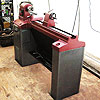
Originally Posted by
Yoshikuni Masato

"...I'd like to hear from more people who actually own some good Japanese tools, or who are tried and true Japanese tools users..."
I own and use a number of Japanese hand tools. Many planes, chisels and saws, all made by "artisan" blacksmiths of some status as "traditional" makers and many of which cost more than I care to admit spending. I have made many of the "dais" or plane bodies for the plane blades and all of the handles for the saws, all leather wrapped with much care. I enjoy using these tools and feel a connection with the tradition and history of their making. I also have a number of fine (expensive) natural water stones and regularly "enjoy" putting a razor edge on my chisels and planes with them.
But....how to answer the question of how much better of a woodworker I am using these fine tools? Certainly, my enjoyment of woodworking is greatly enhanced. But are my mortices "better" than those cut with top quality "western style" chisels? Or those ploughed out with a router? Are my tenons any "better" than if I had cut them with a fine, brass backed, rosewood handled "western style" back saw? Or milled them on a table saw? I'm thinking that they are not.
I believe that this is just like many other things in life. Driving may be much more enjoyable when you have a fine car to drive but you don't get where you are going any faster. You have to balance what it's worth to you as an individual and what you are willing to "make do" with. I have friends who pride themselves in keeping an old battered truck on the road rather than send it to the car crusher and buy a new one. And others who trade in their cars as soon as it loses that "new car smell". What works for you?
YM
This is an excellent response! You know the difference between good workmanship and fine tools and the two are often related.
"All great work starts with love .... then it is no longer work"





 Reply With Quote
Reply With Quote




 and I didn't spend a fortune on the few I have. I use them for lighter type work and they work fine so even if they are crap I am able to use them and will keep them. I just want to get an idea of "how much better" it could be according to the Japanese tool users.
and I didn't spend a fortune on the few I have. I use them for lighter type work and they work fine so even if they are crap I am able to use them and will keep them. I just want to get an idea of "how much better" it could be according to the Japanese tool users.
